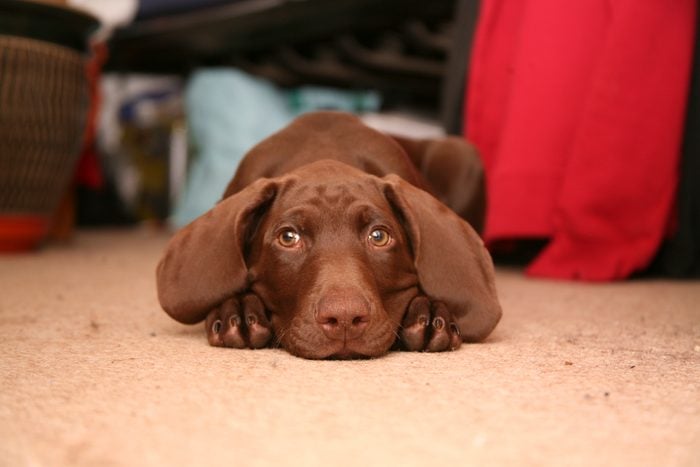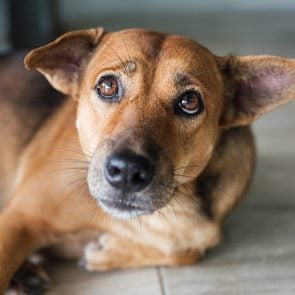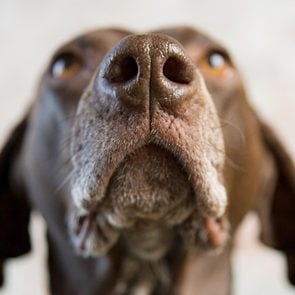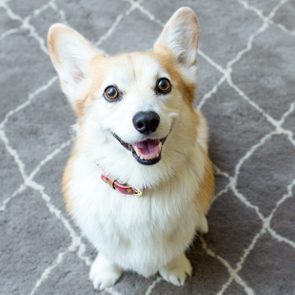Dog Hiccups: Why They Get Them, and Should You Be Worried?
Updated: Mar. 11, 2024

Dog hiccups are totally normal—most of the time. Here, why dogs get hiccups, how you can prevent them and when you should call the vet.
Dog behavior can range from adorable (have you ever seen a dog sploot on the floor?) to perplexing (why do dogs twitch in their sleep? or why dogs howl?) to worrisome (is your dog showing signs of illness or does it just have bad breath?). And there’s another dog behavior that, for most dog owners, probably evokes a reaction that falls somewhere between “Aww, how cute!” and “Er, should I be worried?”: dog hiccups.
That’s right, dogs get hiccups, just like virtually all mammals. But while a dog’s facial expression (like when its nose wrinkles) and body language (like when your dog shakes or when the dog’s tail tries to deliver a message) can convey emotions and conditions such as happiness, fear and aggression, hiccups are more of a physical reaction. But what, exactly, makes your little pup hiccup? To find out, we went straight to veterinary experts, who filled us in on the reasons dogs get hiccups, the ways to stop dog hiccups and the situations in which pet lovers should be concerned.
Get Reader’s Digest’s Read Up newsletter for more pet tips, humor, cleaning, travel, tech and fun facts all week long.
What are dog hiccups?
Anatomically, the hiccups that dogs experience are the same involuntary reaction that humans experience when they hiccup. Angela Topf, DVM, a veterinarian with home-based veterinary service The Vets, explains that hiccups are caused by a spasm or contraction of the diaphragm.
“The diaphragm usually moves smoothly as mammals inhale and exhale,” she says. “But when it contracts suddenly, [it causes] the glottis, or the opening of the airway in the larynx, to briefly close, which causes that classic ‘hic’ sound of a hiccup.”
Why do dogs get hiccups?
If you’re a pup parent, you probably don’t have to ask “Can dogs get hiccups?” The silly sounds coming from your four-legged friend are answer enough. But why on earth is your tiny fur ball hiccuping like, well, a human? There are a number of likely reasons, say the experts, and the three below top the list.
Eating and drinking too fast
Like the human version, dog hiccups come from eating and drinking too quickly, says Dr. Topf. While inhaling their food and water, dogs end up swallowing too much air. Hiccups are the body’s natural reaction.
This isn’t a random phenomenon, though. Some studies suggest that hiccups are the body’s purposeful reflex, aimed at removing excess air from the stomach, which is especially necessary in suckling mammals.
Normal brain development
Scientists have long been studying the whys behind hiccups and have found that they may be an essential part of brain development. Dr. Topf points to a 2019 study that suggests hiccups play a role in regulating breathing in newborns—including puppies. “Just like human babies,” she says, “puppies also experience hiccups much more frequently than adult dogs.”
Overexcitement
When a dog is stressed out or scared (such as by a thunderstorm or fireworks), overstimulated or playing robustly, it may get hiccups. “This is due to a change in breathing patterns, which leads to an increased amount of air in the stomach,” says Dr. Topf. Dogs that are already prone to breathing problems are more likely to get hiccups when overstimulated.
How to get rid of dog hiccups
Your dog’s hiccups will typically last a few seconds to a few minutes, says Texas-based veterinarian Hunter Finn, DVM. But if you want to help your dog get rid of its hiccups, you can try the following pet-care tips.
Go for a walk
Taking your furry friend for a walk may be just the thing you need to distract it long enough for the hiccups to go away, says Dr. Topf. Your dog’s brain will be stimulated and concentrating on something other than its hiccups, which may help alleviate them.
Offer some water
You probably can’t get your dog to try most of the potential remedies for human hiccups—good luck getting Rover to hold his breath or breathe into a paper bag—but you can offer your pup a drink. Cold water may calm the nerves that are stimulating hiccups.
Try a massage
“Helping to relax the muscles and keep the dog calm seems to be effective at reducing the hiccup episodes,” says Dr. Finn. Dr. Topf suggests a gentle chest rub or massage to calm the hiccup spasms.
When should I be concerned about my dog’s hiccups?
Most of the time, dog hiccups are harmless and will pass within a few minutes. But there are a couple instances in which you should be concerned—and talk to your vet.
The hiccups last a long time
Dr. Finn says that if hiccups “are happening more frequently or becoming longer in duration, especially in an older dog,” you should contact your veterinarian to figure out what’s causing this change.
Dr. Topf agrees. “Hiccups lasting over an hour may be an indication of a potential health issue, including gastrointestinal problems, like an upset stomach and intestinal parasites, or respiratory diseases, like bronchitis or pneumonia,” she says. Dr. Finn adds that, while rare, other causes for hiccups may include neurologic diseases that involve the vagus nerve, brain stem, cervical spinal cord or phrenic nerve.
There are other symptoms
Be sure to note any other symptoms your dog is exhibiting along with the hiccups, including coughing, vomiting, diarrhea, wheezing or sneezing. Dr. Topf adds that if your dog’s symptoms aren’t consistent, try taking a video during a hiccuping episode to show to your vet. “This can be extremely helpful in helping to differentiate between something harmless and a sign of a more serious illness in your dog.”
How can you prevent your dog from getting hiccups?
Sometimes dog hiccups just happen, despite your best efforts. Dr. Finn says that unless your dog has a medical disorder that can be treated with medication or special dog food, you can’t really prevent it from getting hiccups. But you can reduce the likelihood of hiccups if you can slow down its eating.
“Dogs that eat more conservatively and do not inhale their food may be less prone to hiccups,” he says. Dr. Topf suggests feeding your dog several small meals a day versus two large meals.
Both of our experts suggest slow-feeder dog bowls or interactive food puzzle toys for slowing down pups who like to gobble their meals. These tools are also a fantastic source of mental stimulation for a bored dog, says Dr. Topf.
Here are a few of our picks:
- Outward Hound Fun Feeder Slo Bowl comes in several styles, sizes and colors, and makes it just a wee bit more challenging for your dog to get at its food, thus slowing down the feeding process.
- Pet Dream House Spin Tricky Level UFO Maze will keep your clever dog engaged while it eats, as it has to push the spinner with its snout to get food to distribute.
- Kong Classic Dog Toy is a nearly indestructible dog toy into which you can insert treats for extended stimulation and play.
- Starmark Bob-a-Lot Interactive Dog Toy holds up to three cups of food but dispenses just a piece or two of kibble at a time.
About the experts
- Angela Topf, DVM, is a veterinarian with The Vets, a mobile pet-care service in the United States. She lives with two dogs: a Labrador-mastiff mix named Tucker and a Labrador named Brody.
- Hunter Finn, DVM, is a companion animal veterinarian at Pet Method Animal Hospital in Mckinney, Texas. A fitness enthusiast, he advocates for strengthening the human and animal bond through health and fitness.
Source:
- Clinical Neurophysiology: “Event-related potentials following contraction of respiratory muscles in pre-term and full-term infants”



